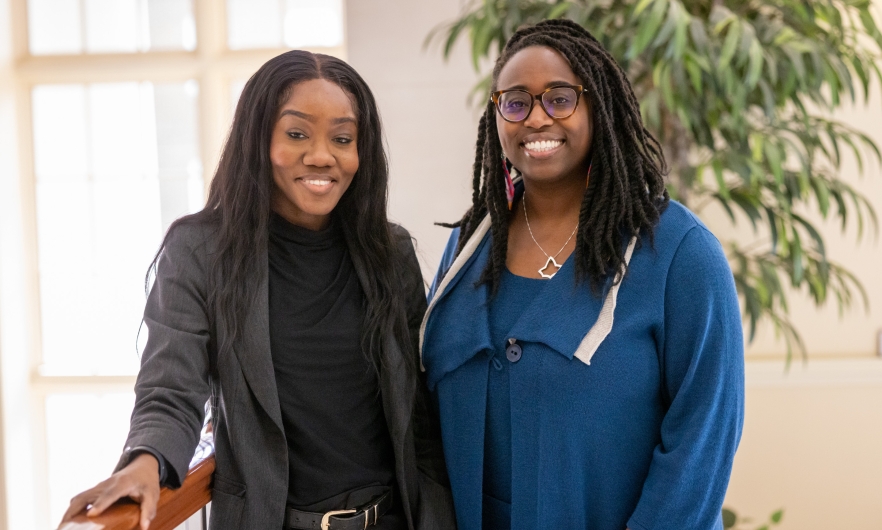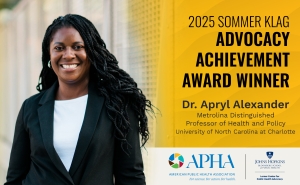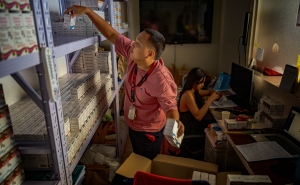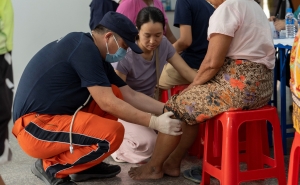Student Spotlight: Glendedora Dolce

PhD student Glendedora Dolce standing with Maryland State Delegate Jennifer White Holland. Holland functions as Dolce's Health Policy Institute host.
For graduate students who are passionate about putting research and policy recommendations into action, the Johns Hopkins Health Policy Institute (HPI) is an invaluable experience. HPI Fellows are paired with Maryland state senators and delegates to perform policy-driven research and analysis, engage with stakeholders and prepare legislative materials, including policy briefs, memos, position papers, written/oral testimony, and legislation itself.
Among the Spring 2024 HPI Fellows is Glendedora Dolce, now in her second year as a Health and Public Policy doctoral student. A former licensed public nurse (LPN), Dolce had dreams of becoming a physician, but decided to pursue a career in public health to prevent injuries, illnesses and health disparities, rather than treating them. She received her master's degree in public health from Emory University, where she became interested in child passenger safety through work at the local health department. After attaining her MPH, she worked at the U.S. Department of Transportation as a Public Health Fellow; it was there that she saw trends that would become the basis of her dissertation. “I noticed there was a higher number of car crash injuries in historically redlined communities,” she says, “so now I’m digging into who exactly is being injured in those communities and what can be done to protect their safety. Hopefully my research can inform urban planners and departments of transportation and ensure they plan with an equity lens.”
Dolce was drawn to the Health and Public Policy PhD program by Johns Hopkins’ reputation as a leader in public health and was entirely convinced after seeing a lecture by HPM Chair Dr. Keshia Pollack Porter and attending Johns Hopkins Center for Injury Research and Policy Summer Institute. “I started looking into the department after that and saw that it really had everything I wanted. It would provide the best education and challenge me in a lot of ways.”
Dolce’s HPI host is Delegate Jennifer White Holland, MSPH, a Bloomberg School alum who also serves as policy and community engagement director for the Horizon Foundation in Howard County. HPI applicants can select up to three lawmakers they would be interested in working with in the Maryland General Assembly, but Glendedora only listed Delegate White Holland because she felt such a strong connection to the delegate’s work. “She has a real passion for health equity and her constituents,” says Dolce, “and she’s sponsored a lot of impactful legislation.” In this year’s Maryland General Assembly session, Delegate White Holland’s bills include the Maryland Maternal Health Act, which strengthens coordination of care for mothers and mothers-to-be, and the Equal Pay for Equal Work Act, which would require employers to post salary ranges on all job listings. “At the very core, justice and equity are key themes in the bills I put forth,” says Delegate White Holland. “For the Equal Pay for Equal Work Act, women, particularly Black women and Latina women, are still at a disadvantage, trying to overcome decades of pay disparities. As I think about younger and future generations, it's important that we have access to information to bring to the negotiating table.”
Dolce has been a vital asset in moving this legislation forward, says Delegate White Holland. “She’s truly a delight and brings a lot of real-life experience. Her unique career path, her interest in land use, transportation and planning and how she participates in issues at that intersection and their impact on public health is at her core. She has been involved in every bill that I have before me, doing research and helping to flesh out questions and answers to various issues. I remember what it was like at the graduate level, so being able to tap her has been a huge help. I also understand her life experience, as another young woman of color, embarking on a journey at Johns Hopkins University. Any way that I can help and provide those opportunities is fulfilling for our office and our district. I'm already wondering how I might keep her on staff long-term. She’s a significant value-add.”
The firsthand experience of HPI in policymaking and politics in the legislative session is likewise a critical value-add for Dolce. “There’s a big disconnect between researchers and policymakers,” she says. “The HPI fellowship has taught me how to communicate with policymakers, thinking as the supporter and the opposer. This will be beneficial when conducting policy research.”
Long term, Glendedora sees herself staying in Baltimore—notably the birthplace of redlining—and becoming involved in policy at the local level. “I want to bridge the gap between research and policymakers,” she says. “It would be very innovative to do both.”





